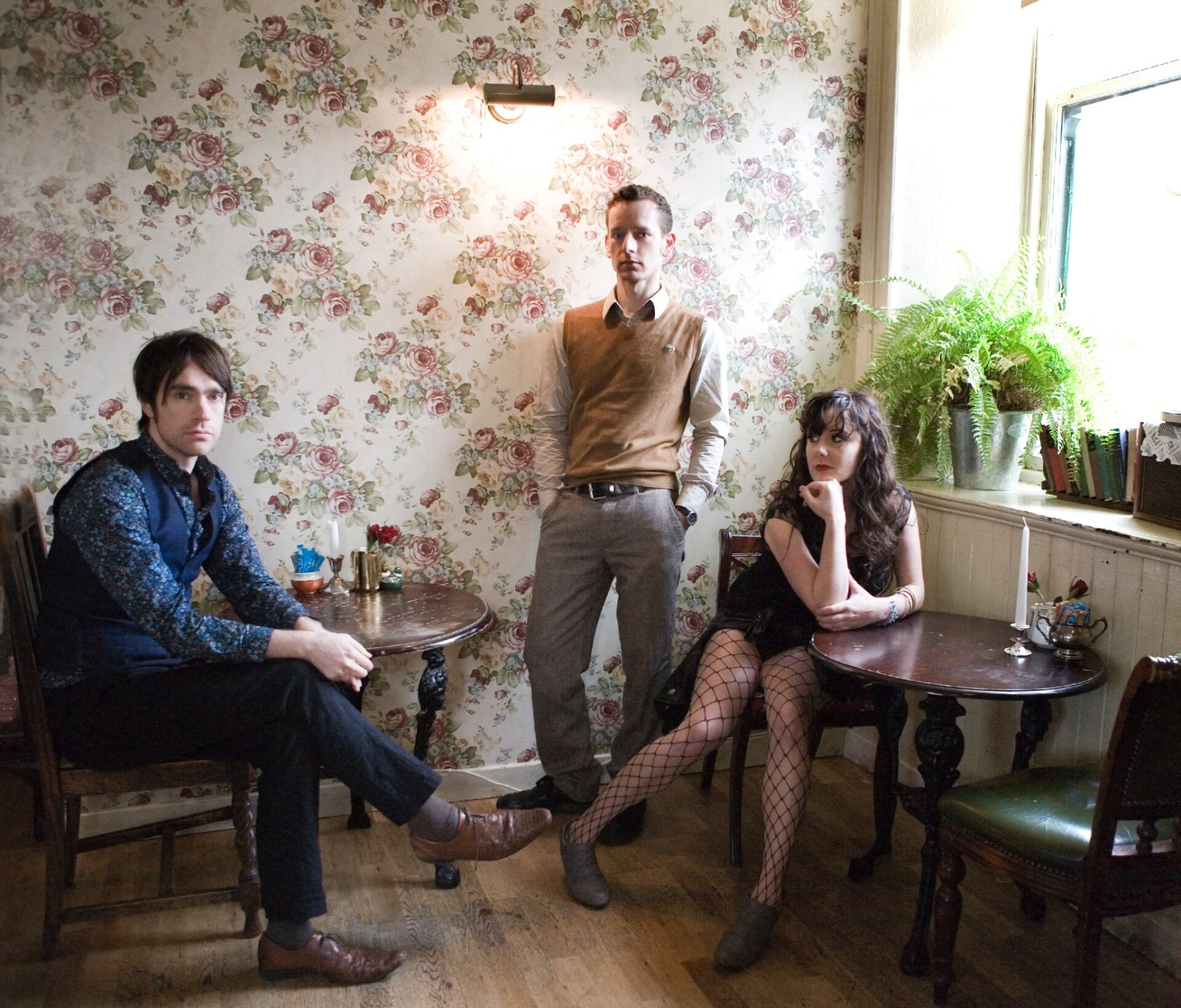Scottish band Swimmer One are marking the 20th anniversary of their debut release with a new compilation, Outliers, including their first new song in a decade, Twenty Years Too Soon, Twenty Years Too Late.
Swimmer One was founded in 2001 by Scottish duo Hamish Brown and Andrew Eaton (now Andrew Eaton Lewis). Laura Cameron-Lewis joined the line-up following The Regional Variations’ release in 2007. While the band have been on hiatus since 2013, Andrew, Hamish and Laura continue to work together frequently on music projects, films, theatre shows, and festivals, often in collaboration with film-maker Daniel Warren, who shot all of Swimmer One’s music videos as well as designing all of their artwork.
Over two superb albums, The Regional Variations (2007) and Dead Orchestras (2010), they crafted a wonderful tapestry of electro-laced pop songs ripe with longing, knowing, regret and rich emotion. Compared favourably with the likes of Pulp, Pet Shop Boys, Blue Nile, theirs was a superior brand of pop music. They are one of Scottish music’s best kept secrets!
Outside of Scotland, Swimmer One are probably best known for the song ‘But My Heart is Broken’, from the soundtrack of director David Mackenzie’s first American film Spread, starring Ashton Kutcher and Anne Heche. In their home country they are probably best known for ‘Whatever Gets You Through The Night’, created in 2012 with theatre director Cora Bissett (who had previously sung on two early Swimmer One songs) and playwright David Greig. The project consisted of a sold out live show, album, book and film.
Today vocalist and songwriter Andrew Eaton Lewis talks us through his eight essential Swimmer one songs:
We Just Make Music For Ourselves (2002/2003)
The debut single by Swimmer One emerged with minimal fanfare in the summer of 2002. Hamish Brown and I were unsigned and had no PR, radio plugger or promotional budget whatsoever. Our friend Daniel did the video and sleeve design for free. We must have done something right, though, because a few days later Mark Radcliffe played ‘We Just Make Music For Ourselves’ on his afternoon show on Radio One, enthusing about it at length and comparing it to Pulp, the Pet Shop Boys, Elbow, the Blue Nile, and even The Who. Then Steve Lamacq, Rob Da Bank, and Vic Galloway championed it on Radio One too. Enthusiastic reviews began appearing on music websites, saying things like “one of the best debut outings I’ve heard in a long while” and “an early contender for record of the year”. Wow, we thought, this pop music thing is easy.
A few days later, a woman from a London record label – whose boss apparently masterminded the success of ‘Believe’ by Cher – flew up to Edinburgh to see us and we went for lunch in Leith. We got on very well and chatted for ages about bands we all loved. The Human League came up quite a lot, as I recall.
Then she asked us if we had any other songs. Only a couple, we said, we’ve mostly just been working on this one. Do you have a live show, she asked, or ideas about what your image should be? Again the answer was no; we’d been so focused on making the single that we hadn’t had much of a chance to think about all that. And so she flew back to London and we never heard from her again.
It took us three more years to do our first gig, and five to finish our debut album. Would life have turned out differently if we’d been a bit more ready at this moment? Possibly not, but I sometimes like to imagine a parallel universe in which this slightly arch yet ultimately sincere song was a proper hit – if not a career-launching hit like West End Girls, then perhaps one of those quirky, unexpected one-off hits, like ‘Brilliant Mind’ by Furniture or ‘I Could Never Be Your Woman’ by White Town. The title – in case it’s not obvious – was a joke, a reference to one of those cliches bands always seemed to come out with in interviews. One of my favourite reviews of the single claimed we’d missed a trick by not including the line “if anyone else likes it that’s a bonus”, failing to spot that we actually had.
Talk Me Down From 20,000ft (2002-2003)
Honestly I think my biggest regret about not becoming a pop star isn’t that I never got to to be on Top of the Pops or be written about in Smash Hits, the benchmarks of musical success when I was a teenager, but that I wasn’t successful enough to spend lots of time and money recording B-sides when I didn’t have to.
I grew up buying vinyl singles, and was introduced to the art of the B-side by the Pet Shop Boys and Prefab Sprout. The Pet Shop Boys, in particular, took them very seriously – this was the place where they cut loose, indulged themselves, and often ended up writing their most distinctive songs, like ‘Jack the Lad’ or ‘In the Night’. Unlike most B-sides they almost never felt like leftovers, songs not quite good enough to make it onto an album. Prefab Sprout wrote brilliant B-sides too. In particular I remember the joy of discovering a 12 inch single of ‘When Love Breaks Down’ which had four great B-sides – ‘The Yearning Loins’, ‘Spinning Belinda’, ‘He’ll Have to Go’ and ‘Donna Summer’. After all this it made me quite cross when a musician I loved released a single whose B-side was just an instrumental or a demo version of the A-side, or a song they’d already released years ago. How dare they be so careless?
I was so determined that the B-side of our first single would be just as good as the A-side that ‘Talk Me Down From 20,000ft’ actually took more time to record than ‘We Just Make Music For Ourselves’. At the time I was a bit obsessed with the minimalist classical composer Steve Reich and, dazzled by the possibilities of the studio software Hamish had introduced me to, was keen to find out what happened if you layered the same Reich-like piano phrase on top of itself multiple times. The answer is that you end up with a horrific mess and spend more time taking things out as you did inserting them in the first place. It was worth it though. It was as good as the A-side. I realise that some people reading this may be thinking “what the hell is a B side?”
https://soundcloud.com/biphonicrecords/talk-me-down-from-20000ft
Come On, Let’s Go! (2003)
Our second single was originally called ‘The Unnamable Disco’ until we decided that was a preposterous title. This was a good decision since we would otherwise have had to spend a lot of time explaining why we’d written a pop song based on The Unnamable by Samuel Beckett. The title we did use was a nod to the famous ‘let’s go’ line in Waiting for Godot. It appealed to my pretentious pop star ambitions that the title sounded like a 1950s rock and roll style song but was actually influenced by 1950s theatre. In my head I was combining populism with intellect in a Neil Tennant sort of way. In reality it was just an obscure joke that nobody got.
‘Come On Let’s Go!’ received one of my favourite ever reviews, from a music website called Delusions of Adequacy. It was quite mean but in a way that was so funny and astute that you felt like applauding. “Swimmer One is a band that sees the world as, quite literally, a dance floor, half-full or half-empty. But despite certain tendencies, this is not really a dance band. Rather, Swimmer One is a pop band that writes about dance music. Only in Britain.”
Another review around that time described us as “Erasure with the fun taken out”, which I loved so much I wanted to put it on our next press release.
How Could Something Like That Be Love (2003)
It’s perhaps telling that by our second single I was already writing lyrics about a failed pop star fading from view. The first of two B sides for Come On, Let’s Go! is a song about a former celebrity who has retreated into the countryside after some sort of scandal, written from the perspective of their loyal partner who has had to nurse them through an unspecified illness. I’m quite proud of the lyrics though, especially the bit about the nosy neighbour who “thought he recognised you from some cheesy one off pop hit, ironically the wrong one”.
https://soundcloud.com/biphonicrecords/how-could-something-like-that-be-love
Lake Tahoe (2003)
Having learned not to spend a silly amount of time making B-sides, we recorded this one very quickly. Ironically, it possibly had a bigger impact on my life than anything else Swimmer One ever recorded. I often find myself telling people what has now become known as ‘the Dave and Kay story’.
‘Lake Tahoe’ consists of a beautiful piece of ambient music accompanied by three slightly different recordings of the same monologue, about a couple called Dave and Kay, ‘upwardly mobile professional types’ from an unnamed big city who go on a weekend snowboarding trip and consider never coming back. The recordings were three alternative takes recorded for an advert, and the script was full of the kind of bland aspirational language you only ever hear in cheesy commercials, but for some reason we became hypnotised by them.
The more versions we listened to, the more it seemed as if something genuinely profound had happened to Dave and Kay, and Daniel Warren’s dream-like film – made up of time lapse footage from three different locations – captured that feeling very well. I liked that the ‘Lake Tahoe’ in Dan’s film was clearly not the real Lake Tahoe, or even in America, or even a lake. Instead, a beach somewhere in Britain – filmed in time lapse over a whole day as the tide fell, rose and fell again – seemed to represent a fantasy wilderness, awe-inspiring and empty, romanticised by two city dwellers as ‘the kind of place I could spend the rest of my life’. Significantly, I think, the film ends not on that beach but back in the city – a different city, in fact. Did Dave and Kay ever start that new life in Lake Tahoe? Not likely, I thought. And so I never asked Dan where the beach was. I thought the film was more poignant if I didn’t know.
The year Dan made ‘Lake Tahoe’, 2004, was also the year I met Laura, who went on to join Swimmer One in 2007 and is now my wife. We must have seen the film quite a few times back then but saw nothing of ourselves in it. It was only years later, after we had children, that we began to plot our own more modest escape from our more modest city existence in
Edinburgh. We looked at houses and little patches of land on Bute, Skye, and Arran before finally ending up on the Isle of Lewis.
After we moved, Laura and I told friends on Facebook how we’d found the kind of place we could spend the rest of our lives. In response, Daniel posted a link to his ‘Lake Tahoe’ film from 2004. I was puzzled. Why was he sending me something I’d watched dozens of times before? And then, for the first time, I realised. Uig beach – two minutes’ walk from the croft we had just bought – was Lake Tahoe.
Did we move to the Outer Hebrides because a film subliminally planted the idea in our minds over the course of 12 years? Were we, on some level, hypnotised into wanting to move there by the constant repetition in our lives of the Lake Tahoe story? It’s possible. That’s not even the spookiest part though. When we moved into our first proper home on Lewis we discovered that our neighbours were another couple from the mainland who had moved to Uig looking for a different kind of life. They were, of course, called Dave and Kay.
Cloudbusting Lovesong (2006)
Back in 2006 we still hadn’t finished our first album, but we had a pretty strong calling card, a double A-side single on London label Dogbox featuring a new song called ‘Largs Hum’ and ‘Cloudbusting’ Lovesong’, a medley of ‘Cloudbusting’ by Kate Bush and ‘Lovesong’ by The Cure, with a nod to ‘Something Good’ by Utah Saints.
‘Largs Hum’ was probably Swimmer One’s signature song, and even has its own spoof, ‘Scotland the Brave’ by London punk band The New Royal Family. It has given me many fond memories, such as the enthusiastic review that praised my ‘Scots Bowie’ accent (I very clearly have an English accent) and the gig at London’s Carling Bar Academy when someone shouted ‘Stoneybridge!’ along to the music, a brilliant heckle. At that same gig we discovered Sparks were playing in the room next door, sneaked in to watch, and were having such a good time we nearly forgot to come back for our set.
In hindsight it would probably have been sensible to include ‘Cloudbusting Lovesong’ on our first album, given that it was one of our most popular songs (even acknowledged on Kate Bush’s Wikipedia page, which makes me happy). Someone later put it on YouTube with the description ‘Cloudbusting – remix’, as if we had somehow found a studio effect that made Kate Bush Scottish. Actually the lead vocal is by our friend Cora Bissett, now a successful theatre director.
At the time I thought it would be funny to make an EP called Swimmer One Meet Girls. This would have consisted of ‘Cloudbusting Lovesong’, plus a remix we’d done for the singer Astrid Williamson and a couple of other tracks we never got round to recording. Instead we persuaded our friend Laura – who we’d met when we performed at a brilliant cabaret/live art night she ran in Edinburgh called Silencio – to join the band. Laura singing ‘Cloudbusting Lovesong’ would later become a consistent highlight of our live shows.
https://soundcloud.com/biphonicrecords/cloudbusting-lovesong
All The Things That Make You Want To Disappear (2012)
I remember telling a friend once that I’d love to be in a cult band, and also her withering response. Nobody wants to be in a cult band, she replied, they want to be in a successful one. A cult band is what you end up being in if that doesn’t work.
I often think Swimmer One’s lack of success may have been largely down to me. Musically our instincts were often spot on. Lyrically, though, I veered towards pseudo intellectual jokes and an almost pathological aversion to the obvious. Somehow that worked to our advantage on ‘We Just Make Music For Ourselves’, less so on a song like ‘The Balance Company’, the first single from our debut album, which combined a great pop hook by Hamish with a lyric by me that attempted to evoke the film Wings of Desire but in a way that made it almost impossible to tell that’s what I was doing.
Anyway, after two albums that were a hit with critics and some DJs if not with the wider public, a song on a movie soundtrack, performing with musicians as varied as Ricky Ross of Deacon Blue and John Foxx of Ultravox, and lots of fond memories, ‘All The Things That Make You Want To Disappear’ turned out to be the end of Swimmer One.
The song, recorded for a big, ambitious theatre project called Whatever Gets You Through The Night, wasn’t intended to be a farewell. What actually made us disappear was mostly just a lack of time. All three band members having young children tends to make getting into a rehearsal room tricky. If there had been huge public demand for a new Swimmer One record we might have found a way but there wasn’t, and our actual lives felt more important. It’s a good swansong, though, one of our best songs and quite different to anything we’d done before.
Twenty Years Too Soon, Twenty Years Too Late (2023)
It feels fitting to mark the 20th anniversary of We Just Make Music For Ourselves with a joyful, optimistic song about missed opportunities. We hadn’t planned to release anything new. Hamish had long been keen to remaster our back catalogue, having learned lots of new studio skills over the years. This required some re-recording of old vocals which had subsequently been lost. In the process he played us some instrumental tracks he’d been working on and one seemed to fit well with a lyric I had half-formed in my head.
Hamish was skeptical about the title at first, because he knows what I’m like and assumed ‘Twenty Years Too Soon, Twenty Years Too Late’ was some sort of joke about the status of Swimmer One. It honestly isn’t. I’ve grown out of that sort of thing in the intervening years and am trying my best to write simple, heartfelt lyrics about real things. This one’s about being a parent to a 20 year old, which turns out to be a much more significant and transformative life experience than trying to be in a cult band for 20 years.
Outliers (Singles revisited, 2003-2023) by Swimmer One is released on 24 March via
Biphonic. www.swimmerone.co.uk.
https://swimmerone.bandcamp.com/album/outliers-singles-revisited-2003-2023




